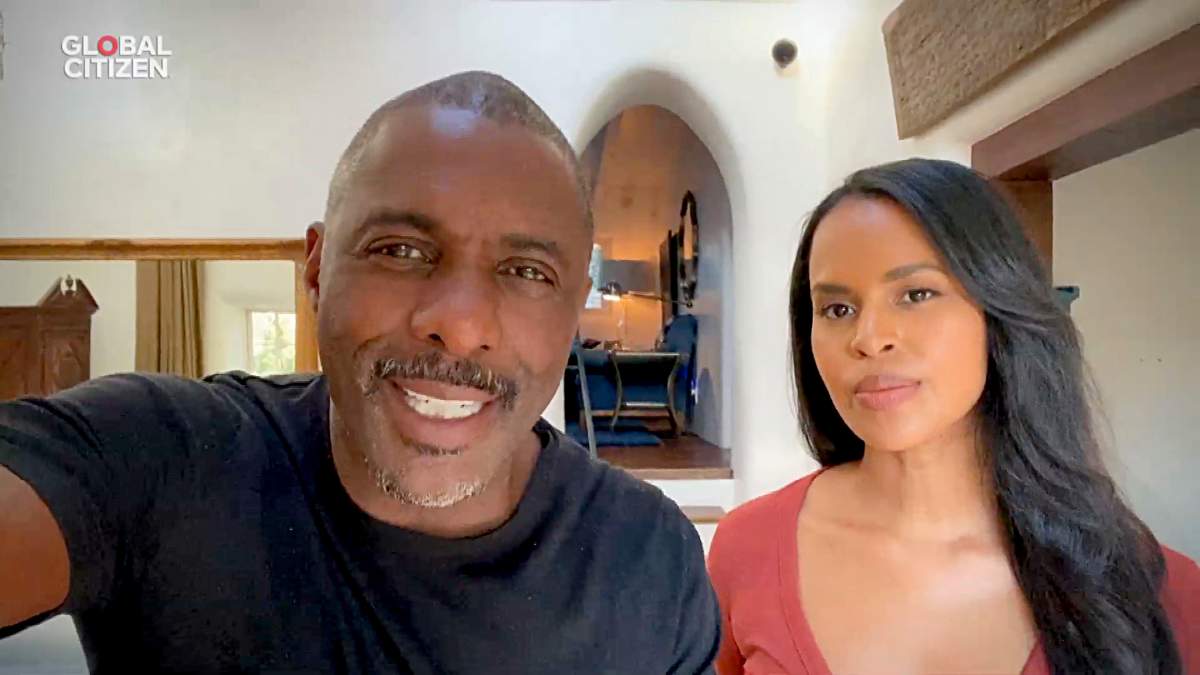Idris Elba and his wife Sabrina Dhowre Elba had their lives “turned around” after contracting the coronavirus in March.

The Elbas called their experience with COVID-19, the disease caused by the virus, “definitely scary and unsettling and nervous.”
“You know, everyone’s sort of feeling the way we have been feeling, but it has definitely been sort of just a complete upheaval,” Elba told the Associated Press last week.
The 47-year-old actor feels that there are life lessons to be learned, and the pandemic serves as a reminder that “the world doesn’t tick on your time.”
“I think that the world should take a week of quarantine every year just to remember this time. Remember each other. I really do,” the Cats actor said.
Elba and his wife are now giving their support to a fund set up by the International Fund for Agricultural Development (IFAD) to help stop economic shocks caused by COVID-19 from triggering a global food crisis.
In their new roles as UN goodwill ambassadors, Elba and Dhowre Elba have joined forces with the United Nations’ IFAD to launch the new $40-million fund.
- ‘Evil Dead’ star Bruce Campbell says he has ‘treatable,’ not ‘curable’ cancer
- Justin Timberlake sues to block unseen bodycam footage from 2024 DWI arrest
- Creator of Tilly Norwood, AI-generated ‘actor,’ launching the ‘Tillyverse’
- Catherine O’Hara gets standing ovation for winning posthumous award at 2026 Actor Awards

“People forget that 80 per cent of the poor population live in these rural areas,” Dhowre Elba said. “What we are really worried about at the moment, and why we are launching this fund, is that those people are being forgotten. While health, you know, is so important at the moment … we don’t want people to forget about what comes after that.”
Elba believes that people living in poor and rural areas will be hit by the pandemic the hardest.
“If you imagine being in a village where no one even knows the name of your village or your population and that you live in a slum where there is one room and six of you live in it,” the Turn Up Charlie actor said. “Social distancing is almost laughable.
“We have to think about the forward planning. What’s the fallout going to be?” Elba added.

Get breaking National news
The couple has been recovering in New Mexico, where the actor was filming when he became sick, but plan to return to London as soon as they can get a flight.
“We’ve been fortunate,” Elba said. “We have been staying in a lovely place that’s been very comfortable for the time. But we’re looking forward to going home.”
Elba revealed that he tested positive for the coronavirus on March 16.
“Stay home people and be pragmatic. I will keep you updated on how I’m doing. No panic.”
In the video he shared on social media, Elba said “it sucks” but that he was “doing OK.”
He said there are “people out there who aren’t showing symptoms and that can easily spread it.
“So now’s a real time to be really vigilant about washing your hands and keeping your distance.”
In late March, Elba responded to a “stupid” conspiracy theory that he and other celebrities are being paid to say they have contracted COVID-19.
Elba spoke about the conspiracy theory on Instagram Live after Cardi B’s recent comments about the U.S. government allowing asymptomatic famous people to access tests while others with symptoms have to wait up to a week to even apply.
“I think the debate about rich and poor and who’s getting it and who’s not, I think, is not a healthy debate,” Elba said on Instagram Live. “It’s like, I got a test but I also got COVID. Does that make me preferential? I don’t understand that.

“I think that the negativity around test-shaming is counterproductive. I don’t see what people get out of that. And also this idea that someone like myself is gonna be paid to say I’ve got coronavirus? That’s absolute bullsh-t.
“Such stupidness. People wanna spread that as if it’s news. That’s stupid. It’s the quickest way to get people sick because there’s no benefit to me and Sabrina sitting here saying we’ve got it or we ain’t got it. I don’t even understand the logic of that,” Elba said of himself and his wife, who also tested positive for the coronavirus.
The Hobbs & Shaw actor told his followers that they need to understand that “this is not a movie.”
—
Questions about COVID-19? Here are some things you need to know:
Health officials caution against all international travel. Returning travellers are legally obligated to self-isolate for 14 days, beginning March 26, in case they develop symptoms and to prevent spreading the virus to others. Some provinces and territories have also implemented additional recommendations or enforcement measures to ensure those returning to the area self-isolate.
Symptoms can include fever, cough and difficulty breathing — very similar to a cold or flu. Some people can develop a more severe illness. People most at risk of this include older adults and people with severe chronic medical conditions like heart, lung or kidney disease. If you develop symptoms, contact public health authorities.
To prevent the virus from spreading, experts recommend frequent handwashing and coughing into your sleeve. They also recommend minimizing contact with others, staying home as much as possible and maintaining a distance of two metres from other people if you go out.
For full COVID-19 coverage from Global News, click here.
— With files from the Associated Press









Comments
Want to discuss? Please read our Commenting Policy first.